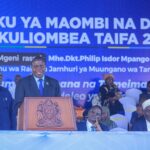The Embassy of Tanzania in Japan celebrated the 60th anniversary of the United Republic of Tanzania by involving the Japanese public, including Japanese who served in Tanzania, Japanese universities and the Diaspora – the Tanzanian society living in Japan (Tanzanite society) and Tanzanian students studying in Japan (Tanzania Students Association in Japan).

The event was also adorned with displays of tourist attractions, culture, business and investment opportunities through the Tanzanian film – The Royal Tour, which was translated into Japanese; and a journal prepared by the Embassy with various articles describing Tanzania’s opportunities and cooperation with Japan – “Tanzania at 60 – Special Supplement”.
History of the Union of Tanganyika and Zanzibar on the Occasion of the 60th Anniversary of the Unification of Tanzania
On this momentous occasion, we commemorate the 60th anniversary of the unification of Tanganyika and Zanzibar, which led to the birth of Tanzania. This historic event, celebrated in Tokyo, Japan, is significant as we reflect on the journey that brought these two regions together. In this article, we delve into the rich history of the Union, exploring its origins, challenges and achievements, while highlighting the enduring spirit of unity that defines Tanzania today.
Origins of the Union:
The history of the Union of Tanganyika and Zanzibar dates back to the early 20th century, when the two regions were under separate colonial administrations. Tanganyika, a German colony, and Zanzibar, a British protectorate, had different political, social and economic systems. However, the desire for independence and self-government united the people of both regions.
Challenges and negotiations:
The road to unification was not without obstacles. The diverse interests and aspirations of the people had to be reconciled and the terms of the union had to be negotiated. The Zanzibar Revolution of 1964, which overthrew the Arab-dominated government, further complicated the process. However, the leaders of both regions showed remarkable statesmanship and commitment to forging a united nation.
Achievements and milestones:
The Union of Tanganyika and Zanzibar, officially established on 26 April 1964, marked the beginning of a new era for Tanzania. Under the leadership of President Julius Nyerere, the country embarked on a path of social and economic transformation. The Arusha Declaration of 1967, which emphasised self-reliance and socialism, laid the foundation for Tanzania’s development policy. The government implemented various initiatives, including the nationalisation of key industries, rural development programmes and free education, which significantly improved the lives of Tanzanians.
Foreign Policy and Pan-Africanism:
Tanzania’s foreign policy under President Nyerere played a pivotal role in shaping the nation’s identity. Nyerere championed the principles of Pan-Africanism, advocating African unity, self-determination and decolonisation. Tanzania supported liberation movements across the continent, including those in South Africa, Mozambique and Zimbabwe. The country also hosted the historic Organisation of African Unity (OAU) summit in 1977, further cementing its position as a leader in the pan-African movement.
Challenges and resilience:
Tanzania has faced many challenges throughout its history, including economic hardship, political instability in neighbouring countries and the HIV/AIDS epidemic. However, the resilience of its people and commitment to unity have enabled the nation to overcome these obstacles. The peaceful transition of power and the consolidation of democracy in recent years demonstrate Tanzania’s determination to uphold the values of the Union.
Tanzania today:
As we celebrate the Union’s 60th anniversary, Tanzania stands as a beacon of stability and progress in East Africa. The country has made significant strides in various sectors, including education, health, infrastructure and tourism. The preservation of its rich cultural heritage, diverse wildlife and stunning landscapes has made Tanzania a popular destination for visitors from around the world. Moreover, the spirit of unity and inclusiveness continues to shape the country’s future, ensuring that all Tanzanians have equal opportunities for growth and development.
The union of Tanganyika and Zanzibar, which gave birth to Tanzania, remains a testament to the power of unity and shared aspirations. Over the past six decades, Tanzania has overcome many challenges and made remarkable progress. As we commemorate this historic occasion, let us reflect on the journey that has brought us here and recommit ourselves to upholding the values of unity, peace and development. Tanzania’s story serves as an inspiration to nations around the world, reminding us that through collective effort, we can build a better future for all.

The 15th Tingatinga Exhibition, a celebration of Tanzanian art and culture, promises to be a vibrant and enriching experience for visitors. With a rich display of traditional and contemporary artworks, the event aims to showcase the diversity and creativity of Tanzanian artists. Visitors can expect to be immersed in a tapestry of colours, patterns and stories that reflect the country’s unique cultural heritage.
The participation of the Embassy of Tanzania in Japan underscores the importance of cultural exchange and cooperation between the two nations. By participating in events such as the Tingatinga Exhibition, both countries have the opportunity to foster mutual understanding and appreciation of each other’s artistic and cultural expressions.
The presence of esteemed personalities such as Mr Shinichi Goto and Mr Toshio Nagase further underlines the importance of the exhibition in strengthening ties between Japan and Tanzania. Their involvement serves as a testament to the enduring friendship and cooperation that exists between the two nations, transcending geographical boundaries and fostering a sense of unity through art and culture.
As the exhibition moves from Yokohama to Nagoya Prefecture, it is poised to attract new audiences and continue its mission of promoting cultural exchange and dialogue. The expansion of the event to different locations allows for a wider reach and enables more people to participate in the celebration of Tanzanian art and culture.
The 15th Tingatinga Exhibition serves as a platform for artists to showcase their talents and share their stories with a global audience. Through their creative expressions, they offer a glimpse into the rich tapestry of Tanzanian culture and invite visitors to appreciate the beauty and diversity that define the country’s artistic landscape.
In conclusion, the Embassy of Tanzania’s participation in the 15th Tingatinga Exhibition in Japan, along with the esteemed presence of Mr Shinichi Goto and Mr Toshio Nagase, represents a meaningful collaboration that transcends borders and celebrates the power of art and culture to foster international connections. As the exhibition continues its journey to Nagoya Prefecture, it will inspire, educate and unite people through the universal language of creativity and expression.
Tanzania Media
- Empowering Communities: How Tanga and Arusha Are Redefining Public Service in Tanzania - 18 April 2025
- The Nineteenth Parliament, Second Session: A Milestone for Tanzania and Zanzibar’s Democratic Journey - 17 April 2025
- Zanzibar’s Healthcare Revolution: Laparoscopic Surgery at Moka Lumumba Referral Hospital - 17 April 2025







































